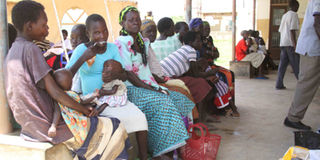Rising malaria cases worry Dokolo officials

Patients at Dokolo Health Centre IV line up at the laboratory for testing recently. The unit lacks Rapid Diagnosis Test kits for malaria and all testing is done by microscope. PHOTO BY HUDSON APUNYO
What you need to know:
Poor mosquito control methods and inadequate testing kits mentioned as some of the drawbacks in fighting the disease.
Dokolo- There is an increase in the number of malaria cases reported in Dokolo District due to poor mosquito control, health officials have said.
Dr Samuel Ojok, the district health officer, said of all the cases received at the Out Patient Departments in the district, about 53 per cent are malaria cases, with children the most affected.
The news comes as Uganda joined the rest of the world to commemorate the 7th World Malaria Day last week. With the government claiming to have made significant strides in the fight against malaria, the case in Dokolo is a step backwards.
Highlighting a number of challenges in fighting malaria, Dr Ojok said the supply of Rapid Diagnosis Test (RDT) for malaria kits, are inadequate and government supplies cover only one species of malaria which is Plasmodium falciparum yet there are others species.
“We appeal to government to provide us with RDT that covers all the malaria species,” Dr Ojok said in an interview as the district marked the World Malaria Day recently.
Dr Okullo Obong, the medical officer in-charge of Dokolo Health Centre IV, in a separate interview, said between January and March this year, they received 606 malaria cases of children below five years, while those above five were 2,080. Dr Obong said the health centre lacks the RDT kits and all testing is done by microscope, which is hectic considering that about 200 cases are detected daily.
The district chairperson, Mr JB Okello Okello, said the district council recently passed a resolution recommending the use of indoor residual spraying (IRS).
Apac district used to be the most malaria prevalent in Lango but after IRS was introduced, the rate of malaria reduced.




